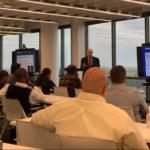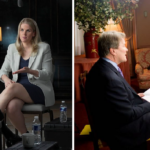
Pick up a newspaper, read the headlines, turn on your TV set and the prevalent news relates to lying, cheating and stealing. Whether it regards our politicians, business professionals, or local leaders much of our daily input is negative.
The trust we put in our elected officials, the media, bankers and business executives is at an all-time low, with members of Congress at the very bottom of the polls on honesty and ethics. Unfortunately, lack of ethics and basic integrity is becoming a new norm.
So it was with great pleasure that I spoke to the University of Kentucky’s Gatton College of Business and Economics this last week. I’d been invited by Urton Anderson, Director of the Von Allmen School of Accountancy at the Gatton College of Business at the University of Kentucky, who heard me speak on several occasions.

The theme of the conference — “Are You Hip? Honesty, Integrity and Professionalism in Business” — with ethics being the focus. Both students and non-students were invited. What was different about this conference was that the focus on ethics was more than a buzzword. The University of Kentucky and the Gatton College are forging a new norm. They approach integrity, ethics and honesty as an integral part of overall expected behaviors. It’s not a “nice to do,” it’s the expectation. And what studies show is that the expectation is what will be followed, especially as it relates to honesty.
Think about this for a moment. We’ve all gone by fruit or flowers stands, which say help yourself and deposit money in the jar please, appropriate to what you take. No one’s minding the store, yet we take the fair share and put in the right amount. At busy newsstands the same, people take their papers and candy and deposit the requisite amount. It’s what’s expected!

As Dr. Dan Ariely, the James B. Duke Professor of Psychology and Behavioral Economics at Duke University says, even when there is training in ethics and a code of conduct, if employees are not really expected to follow the code and act ethically, then they often do not do so.
In the documentary, (Dis)Honesty, based on Dr. Ariely’s work, he points out that if it’s socially acceptable in one’s circle – that is, if others are doing it – that opens the door for us to do the same. Yet, expect others to be honest, give them the opportunity to exhibit “on your honor” behavior and they just might. If a moral code is truly expected by an organization, school, or company’s corporate culture, then it will likely be followed. At Princeton University, for example, students spend a full week in honor code training and sign an honor code pledge. And come test time, no one cheats on their tests!
Hold up a new norm, that of integrity, honesty and ethical behavior and perhaps in the future there might not be such egregious lapses such as occurred when I was at Citigroup. I told this audience about my Citigroup experience, of the one and a half years of warnings with no results. I told them about sending an email to Robert Rubin, who had just been named Chairman of the Board. I mentioned how eventually I was told not to come back to the bank. Of course, I related giving the SEC 1,000 pages of documents just three months before the bank bailouts, how my testimony was buried and then how I was forced to change my written testimony given to the Financial Crisis Inquiry Commission. I also told them about Senator Elizabeth Warren’s discovery, after the National Archives starting releasing the previously sealed FCIC documents, that the FCIC had made 11 separate criminal referrals which had been ignored by former Attorney General Eric Holder. And one of those criminal referrals was based solely on my testimony and evidence.
And I said in looking at the financial landscape today, Wells Fargo being a case in point, little has changed. Marianne M. Jennings, JD, author of The Seven Signs of Ethical Collapse, says, “Ethics instructions during the era in which the crop of officer felons… (recent companies such as ENRON, TYCO, WorldCom, etc., since 2001) was trained, was not virtue ethics. Rather these students were given a heavy dose of social responsibility and little to no discussion of the ethical issues in financial reporting.”
A comfort level developed toward crossing ethical lines – as that was so called kind of accepted business behavior. That is not what is taught at the University of Kentucky’s Gatton College. That is not the norm they accept.
As Dr. Ariely tells us, if we remind people of the code of ethics they have been trained in, if we hold ourselves to the highest standards, if honesty is expected, it often becomes the reality. Could be the highest standards may well become the new norm. Soon, I hope.
Related Posts
Who Lies More: Politicians, Bankers, or You?
If you ain’t cheating…
Speaking Out Has a Price… Are You Willing to Pay the Cost?

 Richard Bowen is widely known as the Citigroup whistleblower. As Business Chief Underwriter for Citigroup during the housing bubble financial crisis meltdown, he repeatedly warned Citi executive management and the board about fraudulent behavior within the organization. The company certified poor mortgages as quality mortgages and sold them to Fannie Mae, Freddie Mac and other investors.
Richard Bowen is widely known as the Citigroup whistleblower. As Business Chief Underwriter for Citigroup during the housing bubble financial crisis meltdown, he repeatedly warned Citi executive management and the board about fraudulent behavior within the organization. The company certified poor mortgages as quality mortgages and sold them to Fannie Mae, Freddie Mac and other investors.






Richard, thank you for “owning” the “whistleblower” name. The brainwashing has been very effective because, even to me, the word does have negative connotations still.
“Officer felons”- another great turn of phrase.